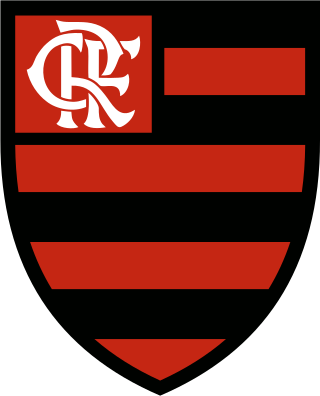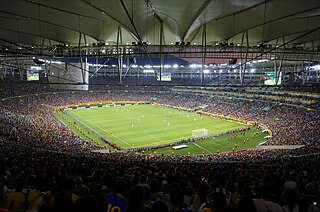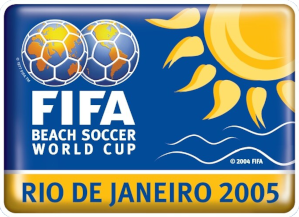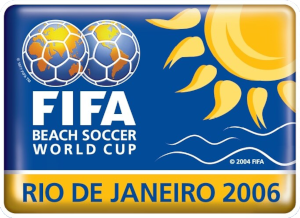
Clube de Regatas do Flamengo, more commonly referred to as simply Flamengo, is a Brazilian sports club based in Rio de Janeiro, in the neighborhood of Gávea, best known for their professional football team that plays in Campeonato Brasileiro Série A, as well as Campeonato Carioca. They are one of two clubs to have never been relegated from the top division, the other being São Paulo.

Club de Regatas Vasco da Gama, commonly referred to as Vasco da Gama or simply Vasco, is a sports club based in Rio de Janeiro, Brazil. Although originally a rowing club and then a multi-sport club, Vasco is mostly known for its men's football team, which currently competes in the Campeonato Brasileiro Série A, the top tier of the Brazilian football league system, and in the Campeonato Carioca, the state of Rio de Janeiro's premier state league.

Leovegildo Lins da Gama Júnior, also known as Léo Júnior or simply Júnior, is a Brazilian football pundit and retired footballer who played as a left back or midfielder.

Football is the most popular sport in Brazil and a prominent part of the country's national identity. The Brazil national football team has won the FIFA World Cup five times, the most of any team, in 1958, 1962, 1970, 1994 and 2002. Brazil and Germany are the only teams to succeed in qualifying for all the World Cups for which they entered the qualifiers; Brazil is the only team to participate in every World Cup competition ever held. Brazil has also won an Olympic gold medal, at the 2016 Summer Olympics held in Rio de Janeiro and at the 2020 Summer Olympics in Tokyo.

Mário Jorge Lobo Zagallo was a Brazilian professional football player, coordinator and manager, who played as a forward.
The FIFA Club World Cup is an international men's association football competition organised by the Fédération Internationale de Football Association (FIFA), the sport's global governing body. The competition was first contested in 2000 as the FIFA Club World Championship. It was not held from 2001 to 2004 due to a combination of factors in the cancelled 2001 tournament, most importantly the collapse of FIFA's marketing partner International Sport and Leisure (ISL), but since 2005 it has been held every year. Views differ as to the cup's prestige: it struggles to attract interest in most of Europe, and is the object of heated debate in South America.

Alexsandro de Souza, commonly known as Alex, is a Brazilian football manager, pundit and retired footballer, who played as an attacking midfielder.

The 2000 FIFA Club World Championship was the inaugural FIFA Club World Cup, the world club championship for men's club association football teams. It took place in Brazil from 5 to 14 January 2000. FIFA as football's international governing body selected Brazil as the host nation on 8 June 1999 as the bid was found to be the strongest among four candidates. The draw was made at the Copacabana Palace in Rio de Janeiro on 14 October 1999. All matches were played in either Rio de Janeiro's Estádio do Maracanã or São Paulo's Estádio do Morumbi.

The 2005 FIFA Beach Soccer World Cup was the first edition of the FIFA Beach Soccer World Cup, an international beach soccer competition contest by men's national teams and organized by FIFA. Overall, it was the 11th edition of a world cup in beach soccer since its establishment with the first Beach Soccer World Championships in 1995. It took place in at Copacabana Beach in Rio de Janeiro, Brazil, between 8 and 15 May.

The 2006 FIFA Beach Soccer World Cup was the second edition of the FIFA Beach Soccer World Cup, governed by FIFA. Overall, this was the 12th edition of a world cup in beach soccer since the establishment of the Beach Soccer World Championships which ran from 1995–2004 but was not governed by FIFA. It took place in Rio de Janeiro, Brazil, from 2–12 November 2006.

The Africa Beach Soccer Cup of Nations (BSAFCON) is the main championship for beach soccer in Africa, contested between senior men's national teams who are members of the Confederation of African Football (CAF). It is the sport's version of the better known Africa Cup of Nations in association football.
The 2001 Beach Soccer World Championships was the seventh edition of the Beach Soccer World Championships, the most prestigious competition in international beach soccer contested by men's national teams until 2005, when the competition was then replaced by the second iteration of a world cup in beach soccer, the better known FIFA Beach Soccer World Cup. It was organised by Brazilian sports agency Koch Tavares.

The 1995 Beach Soccer World Championships was the first edition of the Beach Soccer World Championships, the most prestigious competition in international beach soccer contested by men's national teams until 2005, when the competition was then replaced by the second iteration of a world cup in beach soccer, the better known FIFA Beach Soccer World Cup. It was organised by Brazilian sports agency Koch Tavares.
The 1996 Beach Soccer World Championships was the second edition of the Beach Soccer World Championships, the most prestigious competition in international beach soccer contested by men's national teams until 2005, when the competition was then replaced by the second iteration of a world cup in beach soccer, the better known FIFA Beach Soccer World Cup. It was organised by Brazilian sports agency Koch Tavares.
The 1997 Beach Soccer World Championships was the third edition of the Beach Soccer World Championships, the most prestigious competition in international beach soccer contested by men's national teams until 2005, when the competition was then replaced by the second iteration of a world cup in beach soccer, the better known FIFA Beach Soccer World Cup. It was organised by Brazilian sports agency Koch Tavares.
The 1999 Beach Soccer World Championships was the fifth edition of the Beach Soccer World Championships, the most prestigious competition in international beach soccer contested by men's national teams until 2005, when the competition was then replaced by the second iteration of a world cup in beach soccer, the better known FIFA Beach Soccer World Cup. It was organised by Brazilian sports agency Koch Tavares.

The 2002 Beach Soccer World Championships was the eighth edition of the Beach Soccer World Championships, the most prestigious competition in international beach soccer contested by men's national teams until 2005, when the competition was then replaced by the second iteration of a world cup in beach soccer, the better known FIFA Beach Soccer World Cup. It was organised by Brazilian sports agency Koch Tavares.

The 2003 Beach Soccer World Championships was the ninth edition of the Beach Soccer World Championships, the most prestigious competition in international beach soccer contested by men's national teams until 2005, when the competition was then replaced by the second iteration of a world cup in beach soccer, the better known FIFA Beach Soccer World Cup. It was organized by Brazilian sports agency Koch Tavares in cooperation with and under the supervision of Beach Soccer Worldwide (BSWW), the sports governing body.
The 2004 Beach Soccer World Championships was the tenth and final edition of the Beach Soccer World Championships, the most prestigious competition in international beach soccer contested by men's national teams; the following year, the competition was replaced by the second iteration of a world cup in beach soccer, the better known FIFA Beach Soccer World Cup. It was organized by Brazilian sports agency Koch Tavares in cooperation with and under the supervision of Beach Soccer Worldwide (BSWW), the sports governing body.











